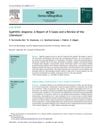 4 citations,
October 2016
4 citations,
October 2016 Herbs like aloe vera and amla are effective and safe for treating hair loss.
 3 citations,
January 2020 in “Clinical dermatology review”
3 citations,
January 2020 in “Clinical dermatology review” Trichoscopy is useful for diagnosing hair and scalp disorders in people with darker skin.
 May 2024 in “Clinical Cosmetic and Investigational Dermatology”
May 2024 in “Clinical Cosmetic and Investigational Dermatology” Manipulating cell cleanup processes could help treat hair loss.
 23 citations,
July 1982 in “International Journal of Dermatology”
23 citations,
July 1982 in “International Journal of Dermatology” The review concludes that accurate diagnosis of different types of hair loss requires proper biopsy techniques and understanding the hair growth cycle and underlying causes.
 21 citations,
March 2006 in “Seminars in Cutaneous Medicine and Surgery”
21 citations,
March 2006 in “Seminars in Cutaneous Medicine and Surgery” Most hair loss disorders can be accurately diagnosed and treated in an outpatient setting.
 15 citations,
January 2018 in “Acta dermato-venereologica”
15 citations,
January 2018 in “Acta dermato-venereologica” Skin treatment can lower life quality for patients with skin conditions.
 July 2024 in “Dermatology Practical & Conceptual”
July 2024 in “Dermatology Practical & Conceptual” COVID-19-related hair loss may have unique features compared to hair loss from other causes.
1 citations,
January 2022 in “Dermatology Research and Practice” Androgenetic alopecia negatively affects self-esteem and daily stress, especially in young men.
 October 2022 in “JAAD international”
October 2022 in “JAAD international” Most patients with autoimmune blistering diseases experienced some hair loss, which may be underreported and linked to disease severity.
 January 2021 in “Turkiye Klinikleri Journal of Dermatology”
January 2021 in “Turkiye Klinikleri Journal of Dermatology” Many young men with hair loss have low levels of vitamin D and B12.
 December 2024 in “Pharmaceutics”
December 2024 in “Pharmaceutics” Extracellular vesicles show promise for treating psoriasis by reducing inflammation and skin lesions.
October 2020 in “Stem cells” The document concludes that DNA methylation and the mTOR pathway are important for stem cell function and could impact disease treatment.
 November 2013 in “John Wiley & Sons, Ltd eBooks”
November 2013 in “John Wiley & Sons, Ltd eBooks” Skin symptoms can indicate endocrine disorders and have various treatments.
 196 citations,
June 2008 in “International Journal of Dermatology”
196 citations,
June 2008 in “International Journal of Dermatology” Dermoscopy helps diagnose and manage alopecia areata by showing specific hair changes.
 September 2020 in “Journal of Investigative Medicine”
September 2020 in “Journal of Investigative Medicine” Omics techniques are needed to understand the scalp microbiome's role in alopecia areata for new treatments.
 January 2016 in “Springer eBooks”
January 2016 in “Springer eBooks” The conclusion is that using the 5W1H method can improve diagnosis and management of childhood hair-pulling disorder.
 25 citations,
December 2017 in “The Journal of Clinical Endocrinology & Metabolism”
25 citations,
December 2017 in “The Journal of Clinical Endocrinology & Metabolism” Birth control pills combined with bicalutamide are more effective at reducing excessive hair growth in women with PCOS than birth control pills alone.
 130 citations,
November 2017 in “Frontiers in Immunology”
130 citations,
November 2017 in “Frontiers in Immunology” The conclusion is that Treg-targeted therapies have potential, but more knowledge of Treg biology is needed for effective treatments, including for cancer.
 13 citations,
June 2013 in “Actas Dermo-Sifiliográficas”
13 citations,
June 2013 in “Actas Dermo-Sifiliográficas” Syphilitic alopecia, linked to syphilis and high-risk sexual behavior, improves with penicillin treatment.
 53 citations,
January 2017 in “Skin appendage disorders”
53 citations,
January 2017 in “Skin appendage disorders” Botulinum toxin shows promise for various skin conditions but requires more research for confirmation and standardized use.
 16 citations,
November 2019 in “Nanomedicine”
16 citations,
November 2019 in “Nanomedicine” Thermoresponsive nanogels show promise for delivering medicine through the skin but need more safety testing and regulatory approval before clinical use.
 7 citations,
December 2020 in “Clinics in Dermatology”
7 citations,
December 2020 in “Clinics in Dermatology” Some alopecia treatments might help treat COVID-19, but more research is needed.
 January 2020 in “Jornal Vascular Brasileiro”
January 2020 in “Jornal Vascular Brasileiro” Anticoagulant therapy may cause hair loss, especially in women, and stopping the medication can lead to hair regrowth.
5 citations,
January 2016 in “Open Journal of Regenerative Medicine” Myoblast transplantation shows promise for treating various muscle and heart conditions.
 February 2024 in “International neuropsychiatric disease journal”
February 2024 in “International neuropsychiatric disease journal” Alopecia areata severely impacts quality of life, mental health, and work productivity.
14 citations,
January 2015 in “Indian journal of dermatology, venereology, and leprology” Methylprednisolone infusions can help some people with severe alopecia regrow hair.
 2 citations,
May 2022 in “Cosmetics”
2 citations,
May 2022 in “Cosmetics” Further research is needed to understand how the microbiome affects hair loss in Alopecia Areata.
 May 2024 in “Portuguese journal of dermatology and venereology”
May 2024 in “Portuguese journal of dermatology and venereology” Reassurance and counseling are key in managing acute telogen effluvium, with supplements possibly offering a placebo effect.
 March 2022 in “IntechOpen eBooks”
March 2022 in “IntechOpen eBooks” Botulinum Neurotoxin-A can treat acne, oily skin, rosacea, hair loss, prevent scars, relieve nerve pain, reduce excessive sweating, and manage psoriasis, but more trials are needed to confirm its effectiveness.
 November 2016 in “Therapeutic Delivery”
November 2016 in “Therapeutic Delivery” New drugs for Alzheimer's and rheumatoid arthritis advanced, a Zika vaccine is in development, and there were business deals in anesthesia and oncology.


























